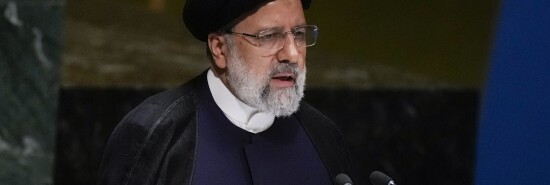
Iran’s president reemphasizes US assassination threats in UN speech
Tom Rogan
Video Embed
The Biden administration’s recent prisoner swap plus $6 billion hostage payment doesn’t look set to facilitate a warming of relations with Iran.
After all, Iranian President Ebrahim Raisi just used his U.N. General Assembly speech to offer a very thinly veiled reminder that Iran is determined to assassinate Americans. In a rambling address on Tuesday, Raisi saluted fallen Islamic Revolutionary Guard Corps Gen. Qassem Soleimani. Describing Soleimani as a “hero of anti-terrorism activities,” Raisi said the general’s January 2020 death via a U.S. drone strike was a “terrorist act.”
UNGA WEEK INVOLVES SPIES AND SECURITY AS MUCH AS DIPLOMACY
This is a creative history.
The facts are clear. Soleimani led the IRGC’s Quds Force external action unit. In that role, he directly plotted to blow up the Saudi ambassador and dozens of Washington, D.C., diners at the Cafe Milano restaurant, he spread murderous mayhem from Baghdad to Beirut, and he was responsible for killing hundreds of American soldiers with explosively formed penetrator devices. As David Finkel documents in his book, The Good Soldiers, these EFP devices turned armored Humvees into swimming pools of American blood, limbs, and death. Put simply, the U.S. was both justified and right to expedite Soleimani’s rendezvous with death.
Iran, however, believes Soleimani was a good guy who didn’t deserve to die. Under Ayatollah Ali Khamenei’s explicit direction, it is out for revenge. As the Washington Examiner first reported, Iranian agents plotted to assassinate former national security adviser John Bolton back in 2021-2022. Numerous other assassination plots have been leveled against U.S. military officers, former Secretary of State Mike Pompeo and former State Department Iran lead Brian Hook. These threats have put exceptional pressure on the protective resources of both the U.S. Secret Service and the Diplomatic Security Service (ironically, Raisi is being provided Secret Service protection while he’s in New York City).
If anyone thought Raisi might take a more diplomatic approach at the U.N., however, they were gravely mistaken. Instead, the president insisted that Iran would employ “all tools and capacities in order to bring to justice the perpetrators and all those who had a hand in [Soleimani’s killing].” Iran would “not rest until that is done,” he said, adding that “the blood of the oppressed will not be forgotten, and the ropes of the guilty will bring them to justice.”
This theatrical rhetoric is a clear play to the martyrdom-vengeance fetish that sits at the heart of Iran’s governing Khomeinist ideology. Essentially, Raisi is reminding the world that his regime believes it has a blood obligation, one imbued with theological grounding, to kill Americans in order to avenge Soleimani.
The Biden administration might thus do well to consider whether gifting Iran $6 billion is a terribly clever idea. That money, after all, will be rather hard to trace after it moves between three or four different bank accounts. And seeing as Raisi says Iran will use the money for whatever purpose it deems fit, that money would be rather useful for an IRGC plot to pay assassins and infiltrate them onto U.S. soil.
